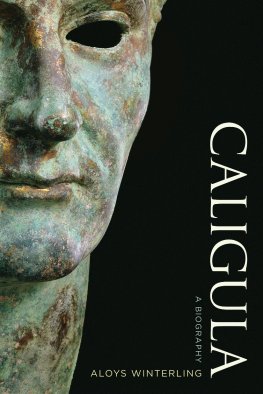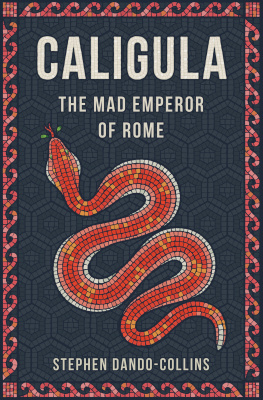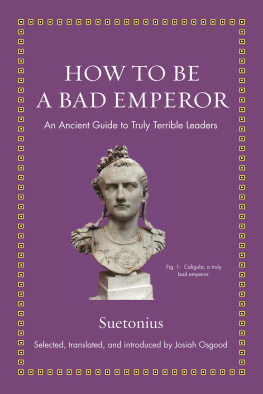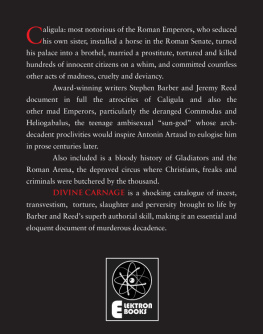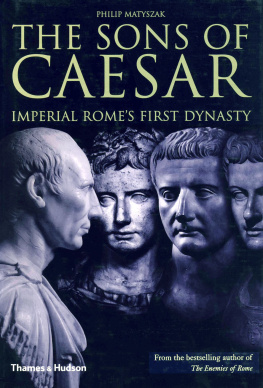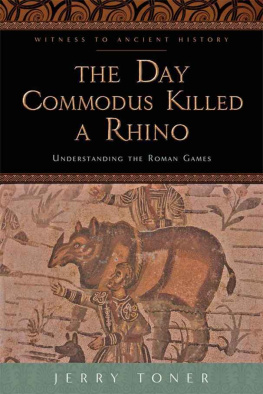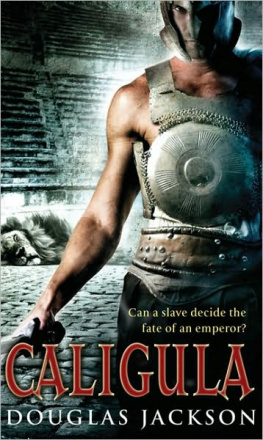Aloys Winterling
Caligula: A Biography
In honor of beloved Virgil
O degli altri poeti onore e lume
Dante, Inferno
Translated by Deborah Lucas Schneider, Glenn W. Most, and Paul Psoinos

The publisher gratefully acknowledges the generous support of
the Classical Literature Endowment Fund of the University of
California Press Foundation, which was established
by a major gift from Joan Palevsky.

Bust of Caligula. Copenhagen, Ny Carlsberg Glyptotek 637 (Inv. 1453). Photo: Ole Haupt.
Dig.
Digesta Justiniani
Dio
Cassius Dio, Roman History
Jos. Ant.
Flavius Josephus, Antiquitates Judaicae
Phil. Leg.
Philo, Legatio ad Gaium
Sen. Ad Helv.
Seneca, Ad Helviam Matrem de Consolatione
De Const. Sap.
Seneca, De Constantia Sapientis
Suet. Aug.
Suetonius, De Vita Caesarum libri: Augustus
Cal.
Suetonius, De Vita Caesarum libri: Gaius Caligula
Claud.
Suetonius, De Vita Caesarum libri: Claudius
Tib.
Suetonius, De Vita Caesarum libri: Tiberius
Vit.
Suetonius, De Vita Caesarum libri: Vitellius
Tac. Ann.
Tacitus, Annales

Figure 1. Ruling Emperors.
INTRODUCTION: A Mad Emperor?
Caligula, the man who was Roman emperor from A.D. 37 to 41, started out as a tyrannical ruler and degenerated into a monster. He drank pearls dissolved in vinegar and ate food covered with gold leaf. He forced men and women of high rank to have sex with him, turned part of his palace into a brothel, and even committed incest with his own sisters. The chief victims of his senseless cruelty were Roman senators. Torture and executions were the order of the day. He removed two consuls from office because they had forgotten his birthday. He considered himself superhuman and forced contemporaries to worship him as a god. He wanted to make his horse a consul and planned to move the capital of the Empire from Rome to Alexandria.
His biographer Suetonius, to whom we owe most of this information, and the other ancient sources have an explanation for this behavior: He was insane. The philosopher Seneca, a contemporary who knew him personally, mentions his madness and calls him a beast. Another contemporary, Philo of Alexandria, who had contact with him as the head of a legation, speaks of his insanity. Pliny the Elder and Flavius Josephus, two authors writing several decades later, mention his absurd behavior and report on his madness. At the beginning of the second century Tacitus, the most noted historian of the Roman Empire, whose account of Caligulas reign has been lost, speaks of the emperors troubled brain. Suetonius, who wrote his biography a little less than a hundred years after Caligulas death, considered him to have been mentally ill, and Cassius Dio, who wrote a voluminous history of Rome at the start of the third century, also believed that the emperor had lost his head.
No wonder, then, that modern scholarship has followed these conclusions: Imperial madness is the standard explanation. Ludwig Quidde, who made this term famous at the end of the nineteenth century, describes this disease as megalomania, carried to the point of regarding oneself as divine; disregard for all limits of law and all the rights of other individuals; brutal cruelty without purpose or reason. Although these elements are also found in other mentally ill people, the unique quality of an emperors madness lay in his position as ruler, which provides particularly fertile soil for the seeds of such a predisposition and permits them to develop unhindered in a manner that is otherwise hardly possible. For Quiddes contemporaries, however, this brief biographical sketch of Caligula had a double meaning, a hidden intention beneath the surface of the words. They saw the depiction as so clearly aimed simultaneously at another emperor, Kaiser Wilhelm II of Germany who was certainly not insane that Quiddes book ran through thirty printings within a short time. It also earned the author three months in prison and ended his academic career. Yet these events did not weaken the impact of his conclusions about Caligula. The author of a recent biography (published in 1991) still describes the emperor as crazy, and a recent survey of the scholarly literature contains references to his imperial madness.
Readers of this biography of Caligula thus appear to be in for quite a story and indeed they are. Matters are considerably more complicated than might appear at first glance, however. It was established during the nineteenth century that ancient accounts of this emperor are by no means as much in agreement as they may seem. Take Caligulas sex life, for example: The claim that the emperor committed incest with his three sisters is misinformation that surfaces for the first time in Suetonius. Its hollowness is easily proved: The emperors two contemporaries Seneca and Philo, who were both familiar with aristocratic circles in Rome and well informed, heap invective on the emperor and would hardly have failed to mention such a charge had it been in circulation then. But clearly they knew nothing about it. The same holds for Tacitus. In his history of the early Empire he discusses at some length the dissolute life of the younger Agrippina, who was Caligulas sister and the wife of the later emperor Claudius. He even considers her capable of having attempted incest with her own son, the emperor Nero. Clearly he would have mentioned any incest between Agrippina and her brother, which would have suited his account, but no such allegation was known to him. Thus the story was invented at some point after Caligulas death.
A further example: A broadly based conspiracy against Caligula took place midway through the year 39, in which many members of the Roman aristocracy participated, including an important military commander in Germania, the emperors sisters, his closest confidant among the senators, and the sitting consuls. It was a highly dramatic occurrence, which threatened the emperors life and fundamentally altered his behavior toward his fellow members of the senatorial order. Curiously, the early sources are completely silent on the matter. Suetonius does not devote a single word to the conspiracy itself; he describes only the emperors apparently confused reactions to it. Yet two casual references to it in his biographies of the emperors Claudius and Vespasian reveal that the events, which are also documented in inscriptions, were well known to him.
Many more examples could easily be given, as will become apparent later. They point to the following conclusion: The accounts of Caligula surviving from antiquity pursue the clearly recognizable goal of depicting the emperor as an irrational monster. They provide demonstrably false information to support this picture of him and omit information that could contradict it. They present the emperors actions out of context, so that their original significance is either completely obscured or can be grasped only with great difficulty. The authors offer assessments of his behavior that often contradict other information contained in their very own accounts.
And finally on the matter of his insanity: Ancient scholars discussed the phenomena and causes of psychopathology from the fifth century B.C. on. During the reign of the emperor Tiberius, Caligulas predecessor, the Roman author Cornelius Celsus wrote on this subject in his books on medicine (

